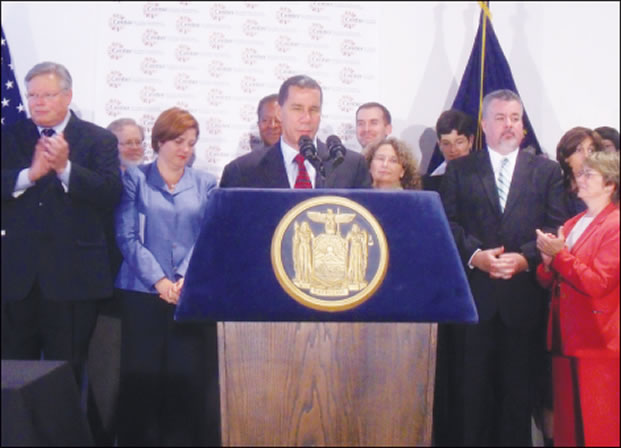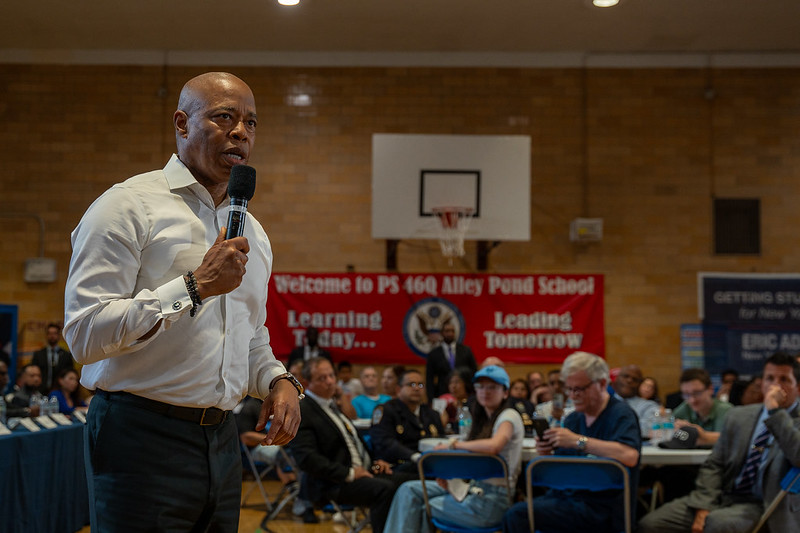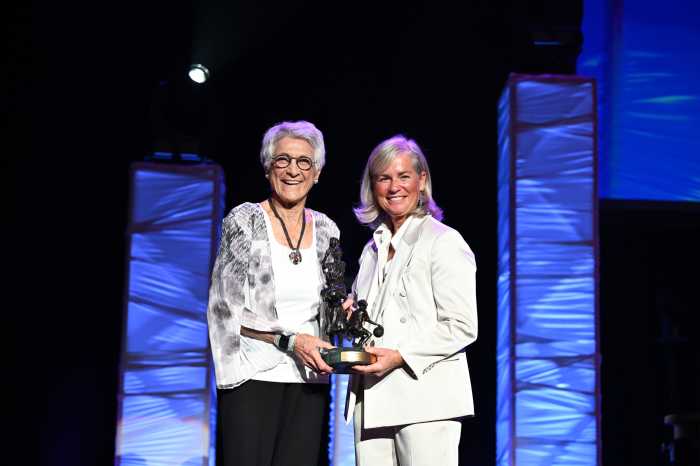BY PAUL SCHINDLER
In a ceremony that brought together advocates for L.G.B.T. youth, members of the state Legislature and City Council, and other elected officials, Governor David Paterson signed the Dignity for All Students Act (DASA) on Wednesday.
The press conference at Manhattan’s L.G.B.T. Community Center on W. 13th St. was something of a valedictory appearance before a gay audience by a New York chief executive outspoken in his support for L.G.B.T. political goals. The Sept. 8 event completed a decade-long effort to enact anti-bullying and anti-harassment protections for public school students based on a wide array of categories, including sexual orientation and gender identity and expression.
The first law approved by New York State to include reference to gender identity and expression, DASA is the most significant piece of L.G.B.T. civil rights legislation since passage of the Sexual Orientation Non-Discrimination Act (SONDA) in late 2002.
Paterson recalled the harassment he suffered as a legally blind grade school student on Long Island. The governor caused no small amount of nervous laughter when he recalled striking back at one of his tormenters by knocking him in the head with his metal lunchbox, noting that the era when he was growing up — the mid-1960s — was a period “that saw bullying as part of going to school…that bullying built character.”
After sharing his lunch-pail tale, Paterson conceded, “That’s not the way to handle the problem.”
The governor noted that New York State’s protections go further than existing federal law that targets bullying based on the race, religion and gender of student victims.
The two openly gay lead legislative sponsors, Assemblymember Daniel O’Donnell and state Senator Tom Duane, both noted that in recent years the legislation’s reach had expanded to encompass, for example, bullying against students based on their physical appearance, such as their weight. Duane said that the Legislature is also interested in tackling the issue of cyber-bullying — which in recent years has led to a number of high-profile tragedies — but must first address First Amendment questions and jurisdictional problems in the case that offenders live outside of New York State.
Duane recalled hosting a forum on the bullying bill several years ago where an Ithaca mother testified in poignant detail about the cruelty her daughter faced on her school bus because she was the only African-American in a student population of white children. The senator explained that the school system’s response was to bar the girl from riding the bus.
“That will never happen again,” Duane pledged. “That will never happen again.”
The signing ceremony was undoubtedly a significant moment in the Senate career of Duane, who represents Greenwich Village and Chelsea as well as the West Side. The Assembly had passed the measure numerous times before after it was first introduced by former member Steven Sanders, who chaired the Assembly’s Education Committee. But the Senate, in Republican hands until January 2009, had resolutely refused a vote on the measure.
Yet, when the bill finally reached the Senate floor on June 22, it was approved by a 58-to-3 vote. Paterson complained at the end of the signing event that nobody had explained how such a lopsided victory capped a 10-year battle against obstinate G.O.P. leadership in the Senate.
Like the governor, City Comptroller John Liu recalled bullying he faced as a public school student in Queens, as one of the few Asian-American youths.
“You never forget the epithets and the insults,” he said, explaining that when he went to his fifth-grade teacher seeking assistance, he was told, “John, you’re just going to have to learn to get along with the other kids.”
Ross Levi, the new executive director of the Empire State Pride Agenda — the state’s L.G.B.T. civil rights lobby — has worked on DASA throughout the bill’s history in several posts at that organization. Levi praised the other leading groups in the coalition pushing for the legislation’s passage, including the Gay, Lesbian and Straight Education Network (GLSEN), the state teachers unions, the New York Civil Liberties Union, the Anti-Defamation League, the Asian American Legal Defense and Education Fund, the state chapter of the National Organization for Women (NOW), the New York Association for Gender Rights Advocacy (NYAGRA) and the Sikh Coalition.
Levi pointed to a 2005 study by Harris Interactive that found that 46 percent of New York State’s students reported hearing racist comments in school; 72 percent, homophobic comments; 77 percent, sexist comments; and 57 percent, negative comments about a student’s gender expression. He also noted a recent study from Massachusetts that showed L.G.B.T. high school students at four times the risk for suicide attempts as their straight peers.
Both Liu and City Council Speaker Christine Quinn pointed out that in 2004 the City Council passed, over Mayor Mike Bloomberg’s veto, a similar anti-bullying measure, which the city Department of Education refused to implement, citing legal precedent that the Council had exceeded its prerogatives. In the last several years, Quinn has worked with the mayor and D.O.E. on the Respect for All program, which Bloomberg administration officials argue goes as far as or further than the Council legislation. However, a number of leading advocates say Respect for All remains largely untested and isn’t yet comprehensive in terms of school personnel training.
While Quinn was oblique in her reference to the Council’s legislation, Liu was more critical of the current administration, saying the 2004 anti-bullying law was something “D.O.E. never took seriously.”
“Hopefully, now they will take it seriously,” the comptroller said, “and we will no longer have the mentality that ‘kids will be kids.’ ”
The governor took particular note of the active advocacy for DASA by New York’s teachers unions. Michael Mulgrew, president of the United Federation of Teachers, which represents New York City public school instructors, challenged old-school conventional thinking about how students can grow stronger by learning to stand up to bullies.
“The things they take away from it are never positive,” Mulgrew said of bullies’ victims.
Duane acknowledged the role played by two state government staffers — his own counsel, Mark Furnish, and Howie Katz, an openly gay aide to Paterson. Katz, prior to working in state government, was a leading advocate for New York’s hate crimes statute, enacted in 2000, also after many years of struggle.






































